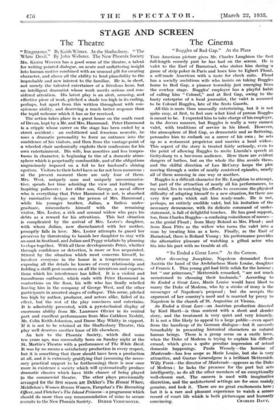Tins American picture g ives Mr. Charles Laughton the first full-length
comedy part he has had on the screen. He is valet to the Earl of Barnstead, who stakes him during 'a game of strip poker in Paris and loses him to Egbert Floud, a self-made American with a taste for check suits. Floud has a socially ambitious wife who insists on taking Ruggles home to Red Gap, a pioneer township just emerging from the cowboy stage. Ruggles' employer has a playful habit of calling him " Colonel," and at Red Gap, owing to the hasty enterprise of a local journalist, the valet is assumed to be Colonel Ruggles, late of the Scots Guards.
All this is more than unusually entertaining, but it is not quite easy, at first, to feel sure what kind of person Ruggles is meant to be. I expected him to take charge of his-employer, in the Jeeves manner, but Ruggles is really a very earnest valet, with traditions of service in his blood. However, the atmosphere of Red Gap, so democratic and so flattering, persuades him to embark on a career of his own ; he sets up as a restaurant proprietor and marries a local widow. This aspect of the story is treated fairly seriously, even to the point of allowing Ruggles to recite Lincoln's speech at Gettysburg to a bar-room audience. Here there are evident dangers of bathos, but on the whole the film avoids them, and the skilful direction of Leo McCarey keeps the plot moving through a series of neatly contrived episodes, nearly all of them amusing in one way or another.
Ruggles is a difficult character for Mr. Laughton to attempt, but part of the attraction of nearly all his performances, to my mind, lies in watching his efforts to overcome the physical difficulty of adapting himself to a new situation, for there are very few parts which suit him ready-made. He is not, perhaps, an entirely credible valet, but his imitation of the necessary demeanour, with its delicate command of under- statement, is full of delightful touches. He has good support, too, from Charles Ruggles—a confusing coincidence of names— as the genial Floud ; from Mary Boland as Mrs. Floud ; and from Zasu Pitts as the widow who turns the valet into a man by treating him as a hero. Finally, as the Earl of Barnstead, there is Roland Young ; his performance provides the alternative pleasure of watching a gifted actor who fits into his part with no trouble at all.
"So Ended a Great Love." At the Curzon.
After divorcing Josephine, Napoleon demanded from Austria the hand of the Archduchess Marie Louise, daughter of Francis I. This young girl had little relish for the honour ; but " our princesses," Metternich remarked, " are not much accustomed to choosing their husbands." According to So Ended a Great Love, Marie Louise would have liked to marry the Duke of Modena, who by a stroke of irony is the messenger of Napoleon's proposal ; but she accepts the argument of her country's need and is married by proxy to Napoleon in the church of St. Augustine at Vienna.
So Ended a Great Love—an Austrian production directed by Karl Hartl—is thus content with a short and slender story, and the treatment is very quiet and very leisurely. It is not a film likely to appeal to a large public—even apart from the handicap of its German dialogue—but it succeeds remarkably in presenting historical characters as natural human beings. There is a group scene on a castle lawn, when the Duke of Modena is trying to explain his difficult errand, which gives a quite peculiar impression of actual domestic happenings. Paula Wessely—the heroine of Maskerade—has less scope as Marie Louise, but she is very attractive, and Gustav Gruendgens is a brilliant Metternich. Willy Forst—the director of Maskerade—appears as the Duke of Modena ; he lacks the presence for the part but acts intelligently, as do all the other members of an exceptionally well-chosen cast. The camera is used with imaginative discretion, and the architectural settings are for once mainly, genuine, and look it. There are no great excitements here ; but it is a rare and pleasant experience to watch a screen record of court life which is both picturesque and humanly




























































 Previous page
Previous page